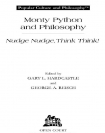Monty Python and Philosophy, Gary Hardcastle [portable ebook reader TXT] 📗

- Author: Gary Hardcastle
Book online «Monty Python and Philosophy, Gary Hardcastle [portable ebook reader TXT] 📗». Author Gary Hardcastle
For life is quite absurd.
And death’s the final word.
You must always face the curtain with a bow.
Forget about your sin—give the audiences a grin.
Enjoy it—it is your last chance anyhow.
Brian lives—and then dies—in an absurd world.
What should one do about the absurdity of life? What can one do? This is a crucial question. Camus argues that in the face of the absurd, the best that one can do—the noble life—is to rebel against the absurdity of life. To do this, one would have to be able to act without hope of reward, conscious that in the long run it makes no difference how one acts. One would refuse to believe in or hope for God-given purpose and instead fight for one’s goals, creating a meaningful life in the very choices one makes.
Several of Camus’s writings illustrate what it would mean to live one’s life in this way, as an “absurd hero.” Three examples of the absurd hero are the characters of Meursault in Camus’s novel The Stranger, Dr. Rieux in The Plague, and Sisyphus in The Myth of Sisyphus. Meursault lives unreflectively. Because he lives unreflectively he lives spontaneously, until he kills someone he does not know and is tried and executed for this murder. It is not easy to see Meursault as a hero, but Camus insists that he is. Let me come back to this. The character of Dr. Rieux is easier to like: he cares for those afflicted by a plague even though they cannot be cured and even though by doing so he may catch the disease. And Sisyphus, the character from the Greek myth, is punished by the Gods by being forced to pointlessly and eternally roll a rock up a hill just to watch it roll back down. According to Camus, however, Sisyphus would not surrender his happiness to the fact that his achievements do not last, and for this reason he would be able to find a grim satisfaction in the task. From a cosmic perspective, the actions of these three characters are insignificant, but they are heroes because they live honestly and authentically.
So the question arises: Is Brian too an absurd hero?
It seems clear that Camus himself would say “No.” Speaking of the meaningless labors of Sisyphus, for example, Camus says, “There is no fate that cannot be surmounted by scorn.”9 Camus apparently means that no matter how difficult one’s life becomes, one is a free being and so one can always rise above one’s circumstances. But Brian is not haughty enough to scorn. He does not look down on his fate. On the contrary, he is constantly irritated and frustrated. The Myth of Sisyphus also says that “[t]he struggle itself towards the heights is enough to fill a man’s heart” (p. 91). It is true that Brian is involved in the struggle for liberation from the Romans. But the movie makes it clear, first, that the struggle is a farce and, second, that Brian is more interested in the homier benefits of Judith. Brian may be placed in an absurd situation, but no one would think he triumphs over it by concentrating on his freedom, by refusing to hope, or by realizing the absurdity of his situation. On the contrary, Brian whines about his lack of freedom, constantly hopes that things will work out, and does not ever become conscious of the absurdity of his situation. Brian lacks a rebellious or defiant recognition of the meaningless of human life. He is not heroic in Camus’s sense.
If Camus has the final say about heroes, then one might conclude that Monty Python’s Life of Brian is pretty cynical. It presents an absurd universe that does not even have a hero in it. But there may be another way to think about the meaningfulness of life and how one should live in a world in which death is the final word. On this scale, Brian fares better.
One thing to note is the centrality of lying to Camus (and to all of the French existentialists). The greatest failure of a person, they say, is when one lives a lie, when one deceives oneself and lives in “bad faith.” Camus has said that Meursault is an absurd hero because he does not lie and that The Stranger is “the story of a man who, without any heroics, accepts death for the sake of truth.” This, Camus adds, is a portrayal of “the only Christ we deserved.”10 But despite what Camus says, it’s not clear that Meursault really is an ideal person. Robert C. Solomon argues persuasively that far from being a completely honest hero, Meursault never reaches the level of consciousness where one can choose to tell the truth or to lie. There is nothing in Meursault to which he can be true.11
One thing that we can say in Brian’s favor, however, is that he does not live a lie. Brian is bluntly, almost childishly forthright. At the beginning of the movie he caves in to the pressure of his sharp-tongued mother, but as he comes into his own, he eventually is able to throw this off. Monty Python’s Life of Brian is in part the story of growing up and becoming—not becoming a hero, but an adult. Perhaps this explains why the song at the beginning of the movie says that there was a baby named Brian who grew up to be . . . a teenager named Brian, who then grew and grew until he who grew up to be . . . a man named Brian. He is not an absurd hero, but he is also not a liar. From this perspective, Monty Python’s Life of Brian rejects





Comments (0)